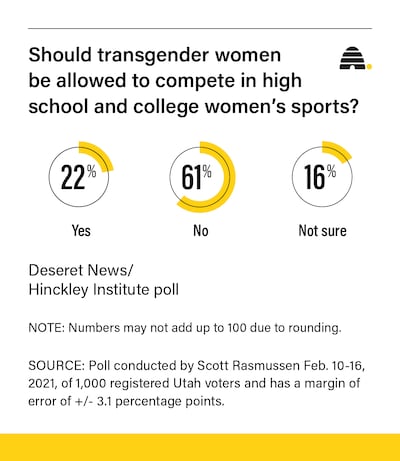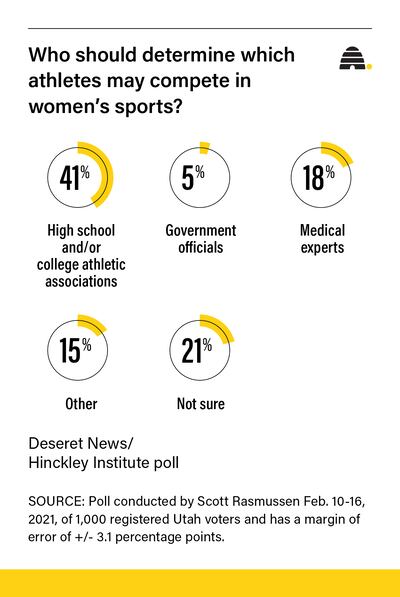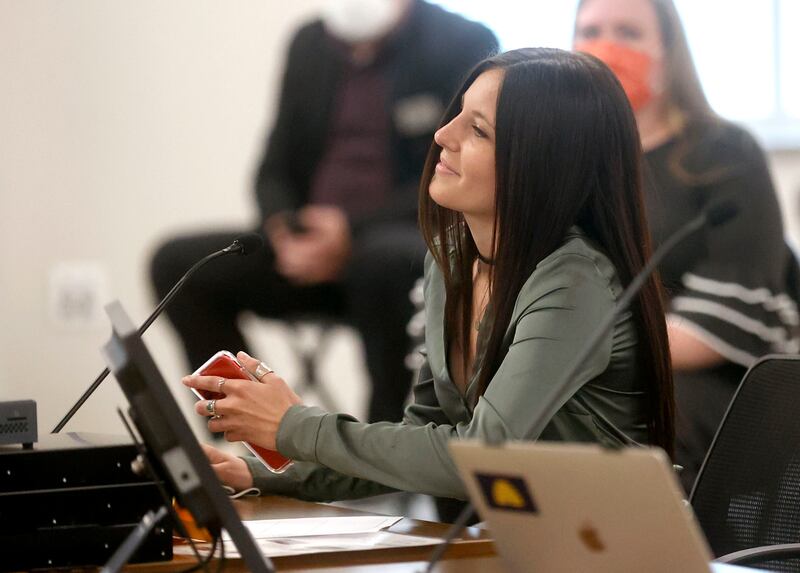As a debate rages on Utah’s Capitol Hill about female transgender athletes, most Utahns believe they shouldn’t get to participate in high school and college women’s sports, according to a new Deseret News/Hinckley Institute of Politics poll.
But the vast majority of residents say lawmakers shouldn’t be the ones tackling the issue.
The survey found that just 22% of Utahns believe transgender girls and women should be allowed to compete in high school and college women’s sports, while 61% say they should not and 16% aren’t sure.

Upon hearing the poll results, Troy Williams, executive director for Equality Utah, wanted to convey a message to transgender girls in the Beehive State.
“I want transgender girls to know that your worth is not dependent upon a Hinckley Institute poll. As a transgender child of God, you have divine worth. As an American, you have unalienable rights. You are here on this planet to soar and thrive, and we will always be fighting for your right to exist,” Williams told the Deseret News.
At the same time, only 5% of Utahns said they feel government officials should determine which athletes should compete in women’s sports, while 41% believe high school and college athletic associations should make that decision.
Another 18% said medical experts should determine what’s best, while 15% said “other,” and 21% said they’re not sure who should make that call.
Pollster Scott Rasmussen surveyed 1,000 registered voters in Utah Feb. 10-16. The poll has a margin of error of plus or minus 3.1 percentage points.
Utah legislators are now considering HB302, titled Preserving Sports for Female Students, which would require public schools to designate athletic activities by sex. It would prohibit a student of the “male sex” from participating in athletic activities designated for female students.
“Sports experts and sports organizations should be the entities that set policies and guidelines for their fields, not lawmakers. This is extreme government overreach,” Williams said.
“This is a solution seeking a problem. This is a group of vehemently anti-LGBT advocates who are trying to bully transgender children. These issues don’t belong debated in your state house,” he said.

During the bill’s emotional first committee hearing last week, several female track athletes from Southern Utah University showed up to support the bill, some of whom spoke about their experiences running against a transgender athlete from another school. They and other female athletes expressed fears of losing their hard-earned spots in athletics.
Rep. Kera Birkeland, R-Morgan, said her bill will promote fairness in sports.
“Across America, there are stories of individuals who identified as male at birth competing against our female athletes. These individuals who identified as male at birth are breaking records that no female will be able to reach. They’re taking championships, titles and scholarships from our female athletes,” Birkeland said.
LGBTQ advocates have decried the bill’s constitutionality and how it could affect transgender youth.
Governor not comfortable with current bill
The bill made its way to the House floor on Wednesday. During that hearing, another debate heated up between some lawmakers who said it would even the playing field and others who fear it would damage transgender youth, hurt the state’s economy and lead to hefty lawsuits against the state. The bill passed the house with a 50-23 vote largely along party lines.
But when asked Thursday if he will sign the bill should it also pass the Senate, Utah Gov. Spencer Cox called it “complicated and difficult” and said “people on both sides of the issue are actually right.”
“There’s a lot of passion, a lot of fiery rhetoric, a lot of name-calling on both sides of the issue,” the governor said, adding that “there are biological advantages with your birth gender. Those are biological facts, and nobody disputes that at all. It is also a fact that women’s sports has had a disadvantage for many, many years. We’ve gotten better but we still have a ways to go.”
When pressed whether he would sign the bill, Cox said, “I”m not in a place yet where I’m comfortable with the bill as it stands right now. ... Those discussions are ongoing. We still have a lot of work to do.”
“These kids — they’re just trying to stay alive. There’s a reason none of them are playing sports,” Cox said of transgender youth, becoming emotional.
“I just think there’s a better way,” he said. “And I hope that there will be enough grace in our state to find a better solution.”
The governor’s remarks mean the bill will likely undergo changes before it has a chance of passing.
As in the Legislature, poll answers about the issue were split along party lines.
Younger Utahns were also more likely to say transgender females should compete with others of that gender, with 32% of residents ages 18-34 saying yes, compared to 22% of those 35-54 and 19% of those 55 and older, according to the survey.
“It’s easy to have strong opinions about something you have no proximity to. And when people have transgender people in their lives whom they love and care about, it changes their perception,” Williams said of the poll results.
Business community speaks
In a statement, a spokesman for the Salt Lake Chamber said the organization believes that rules about transgender students’ participation in sports would “be best handled at the local school district level where accommodations could be made instead of a blanket government mandate.”
Silicon Slopes Commons, the sister advocacy organization of tech-sector nonprofit Silicon Slopes, expressed fears over what the bill could do to Utah’s reputation in the national business community.
Though the group says it “understand(s) and sympathize(s) with the sponsor’s concern over issues dealing with transgender children in sports,” it doesn’t believe the bill is the answer.
“Utah has a reputation problem. From the business perspective, there are constant concerns when recruiting out of state. Companies, recruiters, and even our elected officials work constantly to dispel myths about Utahns, and to expose how amazing our state really is. We are a welcoming, inclusive and supportive community,” the group said in a statement.
“We want what is best for all our children, and we work hard to make that a reality. We want everyone to find success and their home here, regardless of any other barriers that might stand in their way,” leaders with Silicon Slopes Commons said.
The group says the bill is “directly contradictory” to policies already in place by the Utah High School Sports Association and the NCAA. The advocacy group believes the bill could make it more difficult to “attract talent and bring companies into Utah.”
“Additionally, competitions, matchups, and potentially our Olympic bid could be at risk. The money lost from these opportunities will be felt throughout the entire state,” according to the statement.
Last year, the Utah High School Activities Association developed a policy for transgender students in sports after a nearly identical Idaho bill that passed last year and was blocked from implementation by a judge during ongoing litigation.
The activities association allows transgender students to compete on gender-specific sports teams if they are identified as that gender in current school records and in “daily life activities in the school and community” when eligibility is determined. A male-to-female athlete may not participate on a girls team if they are not taking hormone treatment for gender transition, according to the policy.
Mark Van Wagoner, attorney for the Utah High School Activities Association, said the group is neither in favor of the Utah bill nor opposed to it and will enforce it should it pass. But it doesn’t want to face potential lawsuits and asks to be indemnified in the bill.
When deciding on its current policy that was implemented in August, the association looked at the NCAA’s policy at the time. It is intended to “balance the fairness of competition with the opportunity to compete,” Van Wagoner said.
To date, no transgender kids have applied to play on school teams in Utah, he added.
The debate about transgender women in sports is also happening on the federal level and is expected to intensify under the Biden administration.
Sen. Mike Lee, R-Utah, is leading 13 of his GOP Senate colleagues in introducing the Protection of Women and Girls in Sports Act, a bill that he says would protect athletic opportunities for female athletes.
Sen. Mitt Romney, R-Utah, also recently said he believes children “shouldn’t be competing with people who are physiologically in an entirely different category, and I think boys should be competing with boys and girls should be competing with (girls) on the athletic field.”
Contributing: Katie McKellar, Art Raymond


